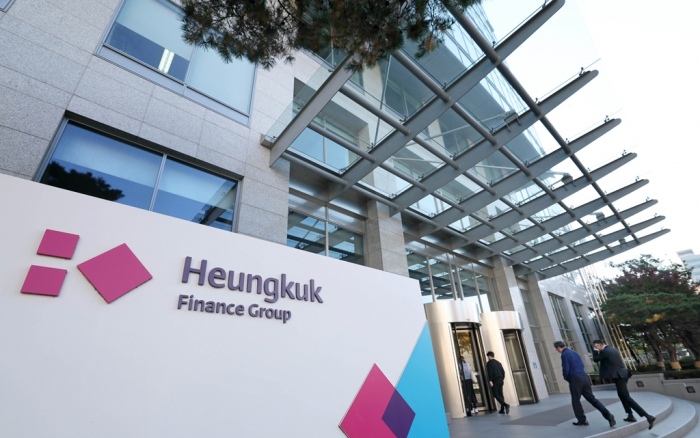Corporate bonds
Small Korean life insurer further rattles bond market
Heungkuk won't exercise a call option for $500 mn in perpetual bonds, deteriorating dollar bond issuance conditions for Korean firms
By Nov 02, 2022 (Gmt+09:00)
3
Min read
Most Read
LG Chem to sell water filter business to Glenwood PE for $692 million


KT&G eyes overseas M&A after rejecting activist fund's offer


Kyobo Life poised to buy Japan’s SBI Group-owned savings bank


StockX in merger talks with Naver’s online reseller Kream


Meritz backs half of ex-manager’s $210 mn hedge fund



A South Korean small insurer has made a rare decision not to buy back dollar perpetual bonds, in the first such case for the country’s issuers in 13 years, adding to signs of a widespread crisis in the local bond market.
Heungkuk Life Insurance Co. said on Tuesday it will not exercise an option to call back $500 million in its dollar perpetual notes scheduled on Nov. 9 in a filing to a financial regulator. That came after the company failed to issue hybrid securities to repay the existing bonds due to recent soured market sentiment, investment banking industry sources said on Wednesday.
It was the first time for a South Korean issuer to decide not to exercise such an option since South Korea’s Woori Bank did not recall $400 million in junior-ranked debt, rattling investor sentiment, in 2009 when the global financial crisis hit the local markets.
After Heungkuk’s decision, investors dumped the dollar perpetual bonds, pushing down their prices to as low as $82 from $99.
The move stroke a further blow to the local bond market, which has already been dampened by the domestic developer's default of a Legoland theme park, as it is likely to cause the country’s corporate sector to also face a liquidity crisis in the foreign currency debt market.
TOUGH MARKET CONDITIONS, LOW RBC RATIO
The insurer in September had sought to issue dollar hybrid securities, including a subordinated bond of 100 billion won ($70.4 million) in South Korea and a foreign currency perpetual note of $300 million, to repay the perpetual bonds issued in 2017.
A perpetual bond often comes with an option for the issuer to buy back the note in about five years.
Heungkuk decided as it failed to sell the hybrid securities, given interest rate hikes by global central banks that dampened investor sentiment.
“We could not find even a single investor although we raised the interest rate to 8% per annum,” said Heungkuk Chief Executive Officer Im Hyung-jun.
Heungkuk’s low risk-based capital (RBC) ratio, a key indicator of an insurer’s financial strength, was also an issue, industry sources said. Its RBC ratio stood at 157.9% as of the second quarter, slightly higher than the practical guideline of 150% set by local supervisory authorities.
The ratio was expected to fall to the 120% level if the company repays the existing bonds without a rollover, industry sources said.
Heungkuk needs to pay more interest as perpetual bonds often have a step-up feature, which increases coupon payments when the issuer doesn't repay them. The yield of Heungkuk’s dollar perpetual bonds is forecast to rise to 6.7% per annum from 4.475% when it sold the notes in 2017.
The insurer plans to assure investors of its determination on the repayment soon.
“We will definitely repay it in six months or one year as the perpetual bonds have call options every six months,” CEO Im said.

SPILLOVER
Heungkuk’s decision quickly dented investor sentiment on South Korean corporate bonds in the dollar debt market.
Investors usually buy perpetual bonds with expectations that the issuer will call them back, but the move dampened such predictions. It will damage the insurer’s reputation and raise concerns over its financial stability, bond market sources said.
The step was also expected to undermine overall confidence in foreign currency bonds issued by other local companies, those sources feared.
Korea Investment & Securities Co. postponed its plan to sell foreign currency bonds. Hana Bank and Shinhan Bank struggled to find investors for their planned issuances of Australian dollar-denominated bonds.
Domestic corporate bond markets are also likely to suffer more. The government has been driving state-run companies to increase foreign currency bond issuances as those blue-chip notes largely absorb demand in the local corporate bond market. But those state companies will have to look to the domestic market if they face tough conditions in overseas markets.
Financial authorities tried to alleviate concerns over Heungkuk.
“Heungkuk Life’s management performance remained healthy and it does not have any problem with insurance payments,” said the Financial Services Commission. “We will keep monitoring the market situation while keeping in communication with institutional investors.”
Write to Hyun-Ju Jang and Hyeong-Gyo Seo at blacksea@hankyung.com
Jongwoo Cheon edited this article.
More to Read
-
 Corporate bondsBOK to ease Legoland developer default-led credit crunch
Corporate bondsBOK to ease Legoland developer default-led credit crunchOct 28, 2022 (Gmt+09:00)
2 Min read -
 Corporate bondsKorea's $35 bn plan yet to ease Legoland default woes
Corporate bondsKorea's $35 bn plan yet to ease Legoland default woesOct 25, 2022 (Gmt+09:00)
4 Min read
Comment 0
LOG IN


